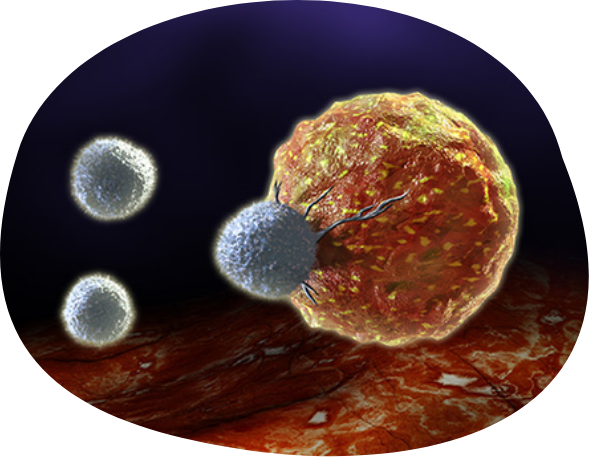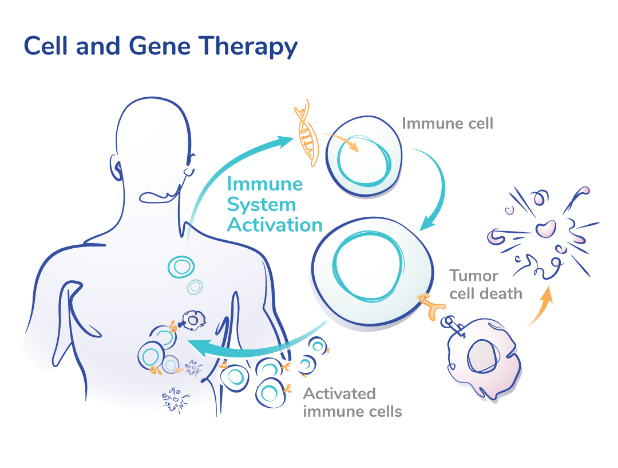What is cancer cell and gene therapy?
Cancer cell and gene therapy is a type of immunotherapy that harnesses the power of the immune system to destroy cancer cells while not harming healthy tissue. This approach to cancer treatment is bringing new hope to people with blood cancers and difficult-to-treat solid tumors. Clinical research is underway to develop groundbreaking therapies for all types of cancer.
Subscribe to our free mailing listTransforming cancer treatment.
Established approaches for treating cancer include surgery, chemotherapy and radiation therapy — all of which come with side effects that can severely impact a person’s quality of life or even contribute to the end of life. Cell and gene therapies are helping to change this.
How cancer escapes the immune system.
Cancer cells behave differently than normal cells because they have faults or mutations in their genes that make them divide too often, live for too long, and clump together into what is called a tumor. As cancer cells continue to multiply, tumors grow and can spread.
The immune system is designed to defend against cancer and other diseases. However, cancer can thrive by hiding from the immune system, which cannot always distinguish between mutant cells and normal cells. Without an activated immune system, the disease can grow without any restraint.
Learn more about cancer and the immune system
How cell and gene therapy fights cancer.
Cancer cells express unique molecules known as antigens, which signal the immune system to attack. Sometimes the immune system cannot detect antigens in cancer cells. Cell and gene therapy can activate the immune system by helping it find these antigens.
Making genetic modifications to cells of the immune system can direct them to search for cancer-specific antigens. This helps the immune system search for and destroy cancer cells more effectively. Once the immune system begins destroying tumor cells, it activates and sends more cells to join the fight.
Learn more about cell and gene therapy
Living medicines.
Cell and gene therapies are developed from human cells and genes rather than in a lab using chemicals. Scientists call cell and gene therapies “living medicines” because they can stay active in the body for many years, resulting in a “cell memory” that helps protect against tumors returning.
For some people, a single treatment of cell and gene therapy has been enough to eliminate their cancer and prevent it from returning for more than 12 years. People with a history of cancer can enjoy their lives without the need for ongoing chemotherapy and radiation treatment.
Learn more about living medicinesTypes of cell and gene therapies for cancer.
Cell and gene therapies are created by genetically engineering the patient’s own immune cells to better fight cancer, modifying a virus to activate an immune response to the cancer, or creating a personalized vaccine based on the patient’s tumor cells. Many innovative approaches are being developed by researchers to replace the toxic and less effective treatments of the past.
There are several types of cell and gene therapy that use various approaches to harness the immune system.
The most advanced approaches are:
CAR T-cell therapy
Tumor-infiltrating lymphocyte therapy
T-cell receptor (TCR) therapy
Oncolytic viruses
Cancer vaccines
Cell and gene therapy breakthroughs.
Alliance for Cancer Gene Therapy enables the world’s brightest scientific minds to explore the unknowns of cancer biology and the immune system and leverage new genetic technologies to defeat cancer. A cancer-free future is possible by combining our funding resources with these scientists’ innovative research.
Today, FDA-approved cell and gene therapies are saving the lives of blood cancer patients thanks to early-stage funding from the Alliance for Cancer Gene Therapy. The focus is now on developing therapies to treat solid tumors like brain cancers, breast cancer, lung cancer, melanoma, ovarian cancer, pancreatic cancer, pediatric cancers, prostate cancer, sarcomas, and more.
See a list of the approved cell and gene therapies


